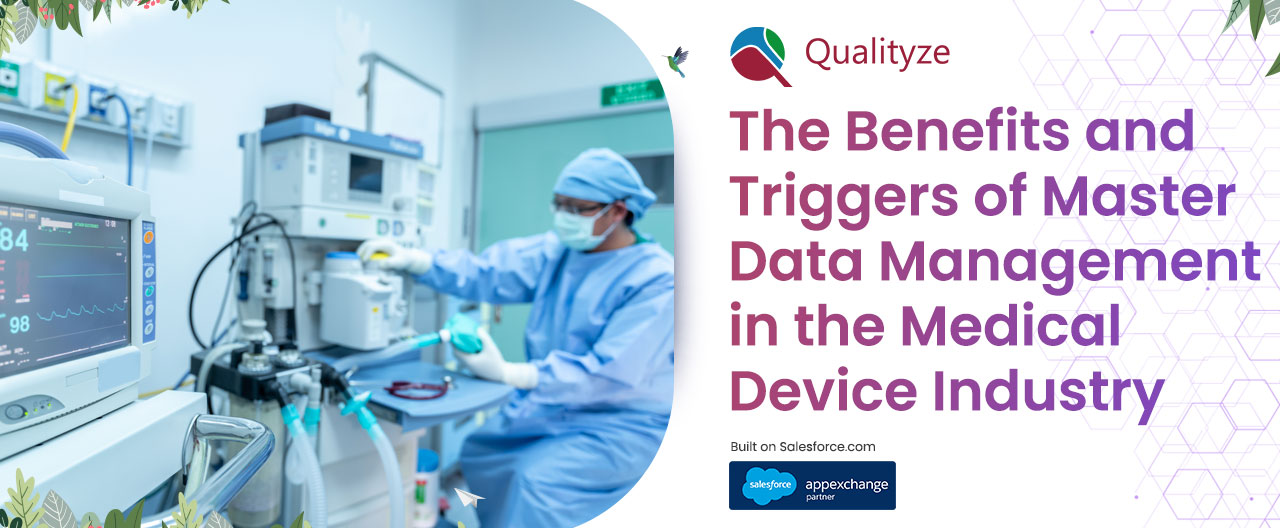Products
Industries

Master Data Management and Quality Management in the medical devices industry work together to ensure safer medical devices before it reaches to the customer. It becomes extremely important that you have the right tools and people to manage such critical functions efficiently. Fortunately, organizations can leverage next-generation quality management software for managing master data and quality processes as per industry proven best-practices.
In recent years, businesses have realized the importance of Master Data Management to stay competitive in today’s fast-paced business environment. With the rapid growth of data and the increasing reliance on technology, businesses need to be able to access, manage, and analyze their data quickly and efficiently. Without proper Master Data Management, companies may struggle to make informed decisions and face many other problems, such as data inconsistencies and duplicate records.
In this blog, we will understand the significance of master data management in the medical device industry, along with its triggers and benefits. Let’s quickly begin with an introduction of the term Master Data Management (MDM).
The master data management process involves creating, maintaining, and ensuring the quality of master data across an organization. Master data refers to the data critical to a business’s operations, such as customer information, product information, and financial data.
In simple words, Master Data Management is like keeping a special set of instructions or information for making sure that all the different parts of a medical device work together correctly.
It’s like having a recipe for making a cake and making sure you have all the right ingredients and instructions before you start baking.
Just like how a recipe helps a cake come out perfect, Master Data Management helps make sure that medical devices work correctly and safely.
It is critically important because the medical devices, like pacemakers or insulin pumps, are used to help people stay healthy and sometimes even save lives. Master Data Management ensures that the information about these devices is accurate and up to date.
MDM ensures the accuracy and consistency of data across the organization. This is important because inaccurate or inconsistent data can lead to errors and inefficiencies, ultimately harming the business. Additionally, MDM helps companies better understand their customers and improve customer relationships by providing a single, accurate view of customer data.
Another critical aspect of MDM is data governance. This refers to the policies and procedures to ensure data is used and managed consistently and ethically. This can include things like data access controls, data quality checks, and data security measures. By having a solid data governance program in place, businesses can ensure that their data is being used in a way that complies with laws and regulations and is protected from unauthorized access or breaches.
Therefore, master data management has become increasingly crucial for businesses as they rely more on data to drive their operations and decision-making. By ensuring the accuracy and consistency of their master data, companies can improve their efficiency, gain deeper insights into their customers, and reduce risks associated with data breaches. Implementing a robust data governance program can also help businesses to stay compliant with laws and regulations and to protect their data from unauthorized access.
Related Article : Major Challenges Medical Device Industries face to Manage their Device Records
Here are some triggers of Master Data Management in the Medical Device Industry:
Having all the relevant data about the devices in one place helps manufacturers understand and meet the needs of their customers, which can help to improve customer satisfaction and retention.
The benefits of master data management extend far beyond overcoming all of the triggers discussed above. Here are some additional benefits of Master Data Management in the Medical Device Industry:
Reduced Costs: By maintaining accurate and up-to-date data, companies can reduce costs associated with errors, inefficiencies, and non-compliance.
Improved Data Governance: By implementing a robust data governance system, companies can ensure that data is accurate, complete, and consistent, which can help to improve data integrity and consistency.
Increased Data Automation: Companies can improve data accuracy and reduce manual errors by automating data processes and workflows.
Better Data Insights: By leveraging data analytics, companies can gain insights into their data and make better decisions.
Increased Data Accessibility: By ensuring that data is accessible to the right people at the right time, companies can improve collaboration and decision-making.
Improved Data Quality: By implementing data validation and verification processes, companies can ensure that data is reliable and relevant for decision-making.
Master Data Management is a crucial aspect of the Medical Device Industry. It helps to ensure that all the information about the devices is accurate and up to date, which can help to improve compliance, traceability, and recall management, supply chain visibility and efficiency, quality and safety, decision-making, data integration, data security, data analytics, and customer satisfaction.
It’s important to keep in mind that both Master Data Management and Quality Management are crucial for ensuring that medical devices are safe and work correctly.
If you want to learn more about how Qualityze products can help you with Master Data Management in the Medical Device Industry, please visit our website at Qualityze.com. Our solutions are designed to help you manage your master data efficiently, effectively and comply with regulatory requirements.
If you have any questions or would like to learn more about Master Data Management with cloud-based EQMS in medical device industry, please feel free to reach out to our customer success team at info@qualityze.com or you can contact us by phone at 1-877-207-8616, and we will get back to you at earliest.